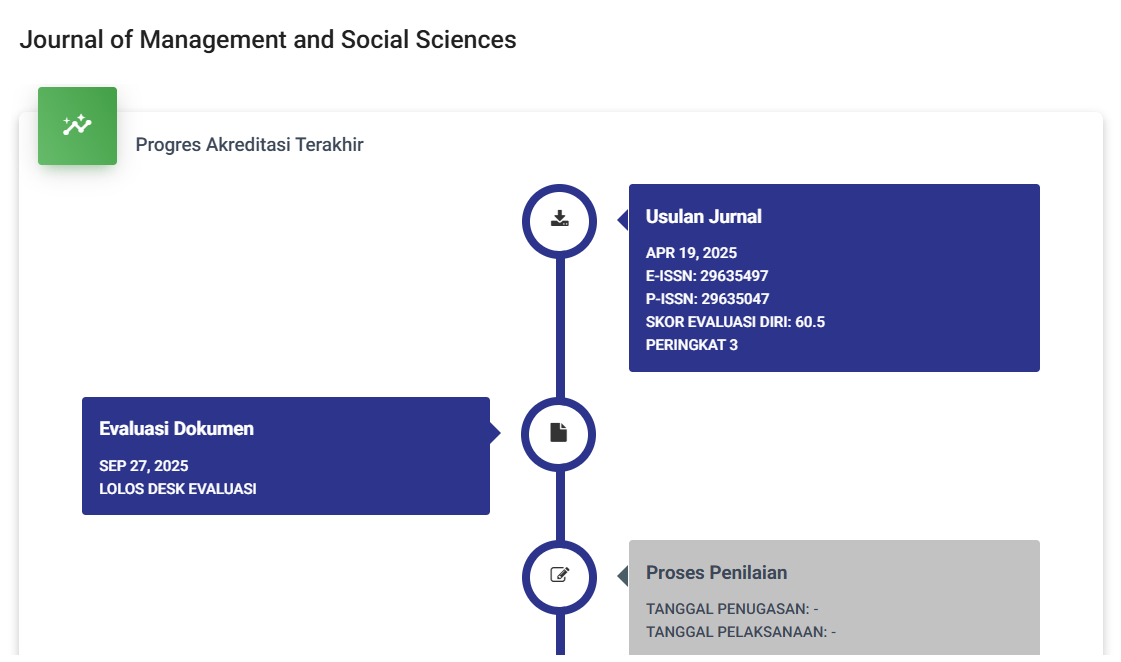Pengaruh Kompetensi terhadap Kinerja Guru Sekolah Dasar Negeri di Kota Makassar
DOI:
https://doi.org/10.55606/jimas.v3i3.1521Keywords:
Competence, Teacher Performance, Public Elementary School TeachersAbstract
This study aims to investigate the influence of competence on teachers' performance in public elementary schools in Makassar City. The methodology employed combines descriptive and confirmatory approaches, which provide a clear depiction of the data and test the influence of identified variables, including discipline, competence, leadership, motivation, and teacher performance. The research is conducted in 58 schools across three districts in Makassar, with the research period planned for three months, from April to July 2024. The results indicate that although leadership has a positive influence on teacher performance, the impact is not significant. This finding suggests that factors such as the school environment and resource limitations can affect the effectiveness of leadership in enhancing performance. This study provides important insights for developing educational policies that better support improving teacher performance at the elementary level.
References
Akman, Y. (2021). The relationships among teacher leadership, teacher self-efficacy, and teacher performance. Journal of Theoretical Educational Science, 14(4), 720-744.
Alimmudin, A. M. R., & Basuki, S. (2022). The effect of teacher competence, work discipline, and work motivation on teacher performance. International Journal of Social Science and Human Research, 5(6), 2422-2427.
Altunova, N., & Kalman, M. (2020). Factors affecting classroom teachers' job performance: A qualitative-dominant analysis with Q-sorting. Research in Pedagogy, 10(2), 285-312.
Anik, G. (2007). Panduan penelitian dan pengembangan bidang pendidikan dan pembelajaran. Yogyakarta: Lembaga Penelitian UNY.
Ardliana, B., Rusdarti, R., & Suminar, T. (2020). Effect of principal leadership, school culture and pedagogic competence through work motivation on teachers' performance. Educational Management, 10(2), 273-283.
Bogler, R. (2001). The influence of leadership style on teacher job satisfaction. Educational Administration Quarterly, 37(5), 662-683.
Cuban, L. (2001). How teachers taught: Constancy and change in American classrooms, 1890-1990. Teachers College Press.
Dale, T. A. (2012). Kinerja (Performance). Jakarta: PT. Gramedia Asri Media.
Danielson, C. (2016). Talk about teaching!: Leading professional conversations. New York: Corwin Press.
Dervenis, C., Fitsilis, P., & Latrellis, O. (2020). A review of research on teacher competencies in higher education. ERIC, 19(4), 1-22.
Dimyati, & Mudjiono. (2015). Belajar dan pembelajaran. Jakarta: Rineka Cipta.
Elmore, R. F. (2006). International perspectives on school leadership for systemic improvement. Politics, (July), 1-28.
Fauth, B., Decristan, J., Decker, A. T., Büttner, G., Hardy, I., Klieme, E., & Kunter, M. (2019). The effects of teacher competence on student outcomes in elementary science education: The mediating role of teaching quality. Teaching and Teacher Education, 86.
Gazmuri, C., Manzi, J., & Paredes, R. D. (2015). Classroom discipline, classroom environment, and student performance in Chile. Cepal Review.
Ghozali, I., & Latan, H. (2012). Partial least square: Konsep, teknik, dan aplikasi SmartPLS 2.0 M3. Semarang: Badan Penerbit Universitas Diponegoro.
Ginting, J., & Purba, C. B. (2019). The effect of principal's leadership, discipline, and competence on teacher performance in Saint Yakobus Foundation Jakarta. International Journal of Innovative Science and Research Technology, 4(8), 1-12.
Gomes, F. C. (2017). Manajemen sumber daya manusia. Yogyakarta: Andi Offset.
Griffith, J. (2004). Relation of principal transformational leadership to school staff job satisfaction, staff turnover, and school performance. Journal of Educational Administration, 42(3), 333-356.
Hadiati, E. (2018). Pengaruh disiplin kerja terhadap kinerja guru Mts Se-Kota Bandar Lampung. Al-Idarah: Jurnal Kependidikan Islam, 8(1), 50-65.
Hair, J. F., Anderson, R. E., Tatham, R. L., & Black, W. C. (2006). Multivariate data analysis with readings (6th ed.). New York: McMillan Pub. Company.
Hair, J. F., Hult, G. T. M., Ringle, C. M., & Sarstedt, M. (2010). A primer on partial least squares structural equation modeling (PLS-SEM) (2nd ed.). Thousand Oaks: Sage Publications, Inc.
Hamzah, B. U., & Lamatenggo, L. N. (2014). Teori kinerja dan pengukurannya. Jakarta: Bumi Aksara.
Hasibuan, M. (2017). Manajemen sumber daya manusia. Jakarta: Bumi Aksara.
Hurlock, E. B. (2016). Psikologi anak (Vol. 2). Jakarta: Erlangga.
Husdarta, J. S., & Saputra, Y. M. (2013). Belajar dan pembelajaran. Bandung: Alfabeta.
Jamil, S. (2014). Guru profesional: Pedoman kinerja, kualifikasi & kompetensi guru. Yogyakarta: Ar-Ruzz Media.
Karim, A., Kartiko, A., Daulay, D. E., & Kumalasari, I. D. (2021). The effect of the supervision of the principal and the professional competency of teachers on teacher performance in private MI in Pacet District. Nidhomul Haq: Jurnal Manajemen Pendidikan Islam, 6(3), 497-512.
Koh, W. L., Steers, R. M., & Terborg, J. R. (1995). The effects of transformational leadership on teacher attitudes and student performance in Singapore. Journal of Organizational Behavior, 16(4), 319-333.
Mahaputra, M. R., & Saputra, F. (2021). Literature review the effect of headmaster leadership on teacher performance, loyalty and motivation. Journal of Accounting and Finance Management, 2(2), 103-113.
Miller, A. D., Ramirez, E. M., & Murdock, T. B. (2017). The influence of teachers' self-efficacy on perceptions: Perceived teacher competence and respect and student effort and achievement. Teaching and Teacher Education, 64, 260-269.
Montilla, V. R., et al. (2023). Teachers' pedagogical digital competence as relevant factors on academic motivation and performance in physical education. International Journal of Scientific and Management Research, 6(6), 45-58.
Mukhtar, A., & Luqman, M. D. (2020). Pengaruh kompetensi guru terhadap kinerja guru dan prestasi belajar siswa di Kota Makassar. Idaarah, 4(1), 1-15.
Mulyasa, E. (2013). Standar kompetensi dan sertifikasi guru. Bandung: PT Remaja Rosdakarya.
Mulyasa, E. (2014). Pengembangan dan implementasi kurikulum 2013. Bandung: Remaja Rosdakarya.
Mulyasa, E. (2022). Manajemen dan kepemimpinan kepala sekolah. Jakarta: Bumi Aksara.
Downloads
Published
Issue
Section
License
Copyright (c) 2024 Nur Aeni, Mattalatta Mattalatta, Ansar Ansar, Kurniawaty Sandra

This work is licensed under a Creative Commons Attribution-ShareAlike 4.0 International License.








